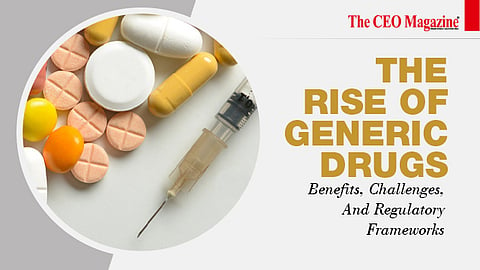
- News
- Women
- Magazine
- IndustryIndustry
- InsightsInsights
- Success Stories
- PublishPublish
- ContactContact
- Media KitMedia Kit

The Rise Of Generic Drugs
Generic drugs are an increasingly important part of healthcare, providing a cost-effective alternative to brand-name medications. In this article, we will explore the benefits and challenges of generic drugs, as well as the regulatory frameworks that govern their development, approval, and distribution.
Generic drugs are pharmaceuticals with the same active ingredients as brand-name drugs but are sold under different names and at lower prices. These drugs are generally produced after the patent on the original drug has expired, allowing other manufacturers to create equivalent products.
Because generic drugs do not require costly research and development, they can be sold at lower prices than brand-name drugs, making them an attractive option for patients, healthcare providers, and insurers.
There are several benefits to the use of generic drugs. First, they are typically more affordable than brand-name drugs, making them accessible to more patients.
This can be particularly important for individuals who lack health insurance or have limited financial resources. In addition, the lower cost of generic drugs can help reduce healthcare costs for individuals, governments, and other payers.
Second, generic drugs are subject to the same rigorous standards for safety, efficacy, and quality as brand-name drugs. This means that patients can expect the same level of effectiveness and safety from a generic drug as they would from a brand-name drug.
In fact, the FDA requires that generic drugs be bioequivalent to their brand-name counterparts, meaning that they must have the same active ingredients, dosage, and intended use as the original drug.
Despite the benefits of generic drugs, there are also several challenges associated with their development, approval, and distribution. One of the biggest challenges is the potential for patent litigation and regulatory hurdles.
Because generic drugs are often developed after the patent on the original drug has expired, there can be legal and regulatory obstacles to their approval and distribution.
In some cases, brand-name drug manufacturers may file lawsuits to prevent or delay the approval of generic drugs or may engage in other practices to maintain their market dominance.
Another challenge associated with generic drugs is the potential for manufacturing and quality control issues. Because multiple manufacturers produce generic drugs, there is the potential for variability in the quality and consistency of the drugs.
This can lead to concerns about the safety and efficacy of generic drugs, particularly when they are produced in countries with less stringent regulatory oversight.
To address the challenges associated with generic drugs, several regulatory frameworks are in place to ensure their safety, efficacy, and quality.
In the United States, the FDA is responsible for approving and regulating generic drugs and requires that they meet the same standards for safety, efficacy, and quality as brand-name drugs.
In addition, the FDA requires that generic drugs be bioequivalent to their brand-name counterparts, meaning that they must have the same active ingredients, dosage, and intended use as the original drug.
In other countries, similar regulatory frameworks are in place to ensure the safety and quality of generic drugs. For example, the European Medicines Agency (EMA) is responsible for approving and regulating generic drugs in the European Union. It requires that they meet the same standards for safety, efficacy, and quality as brand-name drugs.
Generic drugs are an important and growing part of the healthcare landscape, providing a cost-effective alternative to brand-name medications.
While challenges are associated with their development, approval, and distribution, regulatory frameworks are in place to ensure their safety and quality.
As healthcare costs continue to rise, the use of generic drugs is likely to become even more important in improving access to affordable and effective treatments for patients worldwide.
Follow us on Google News
